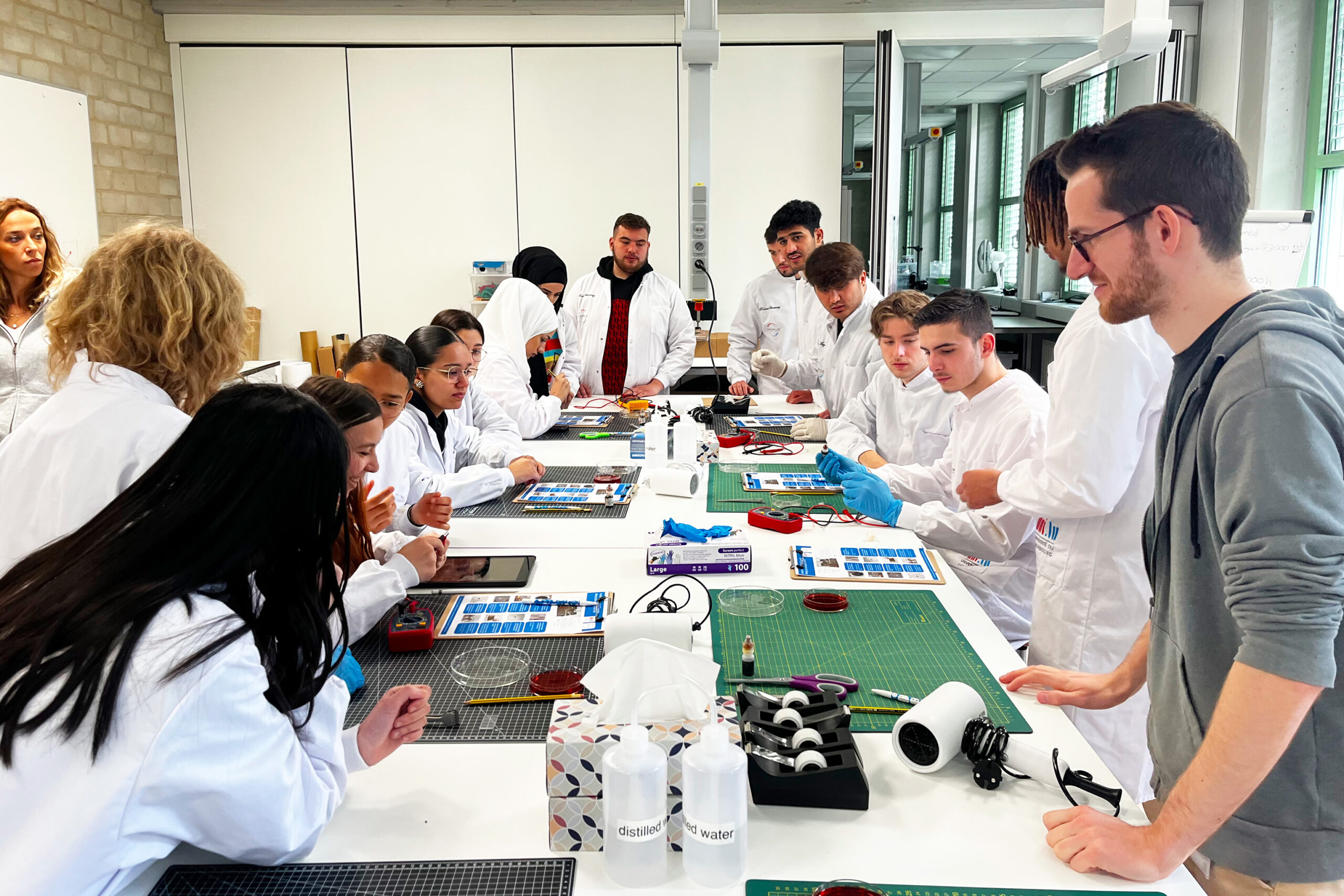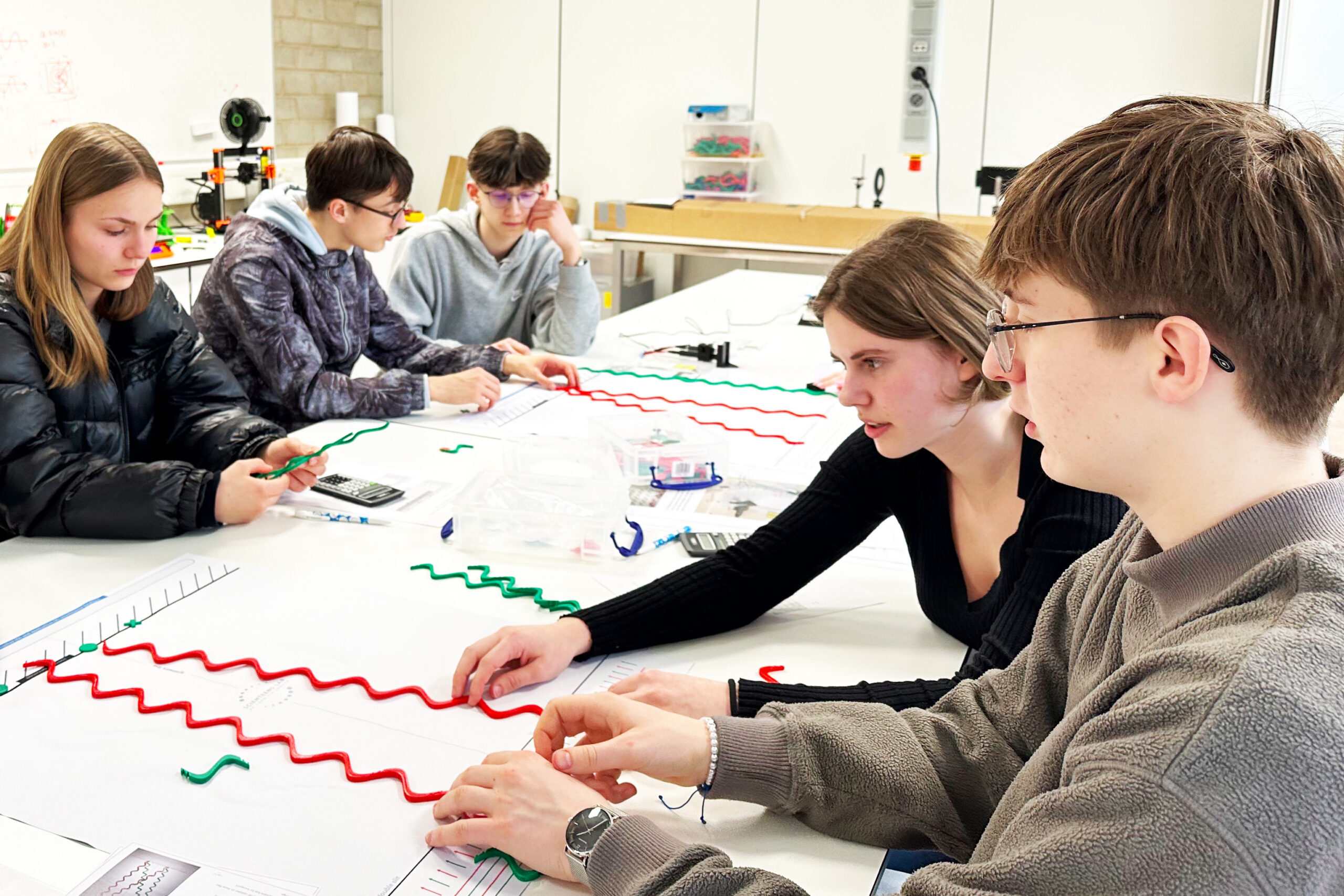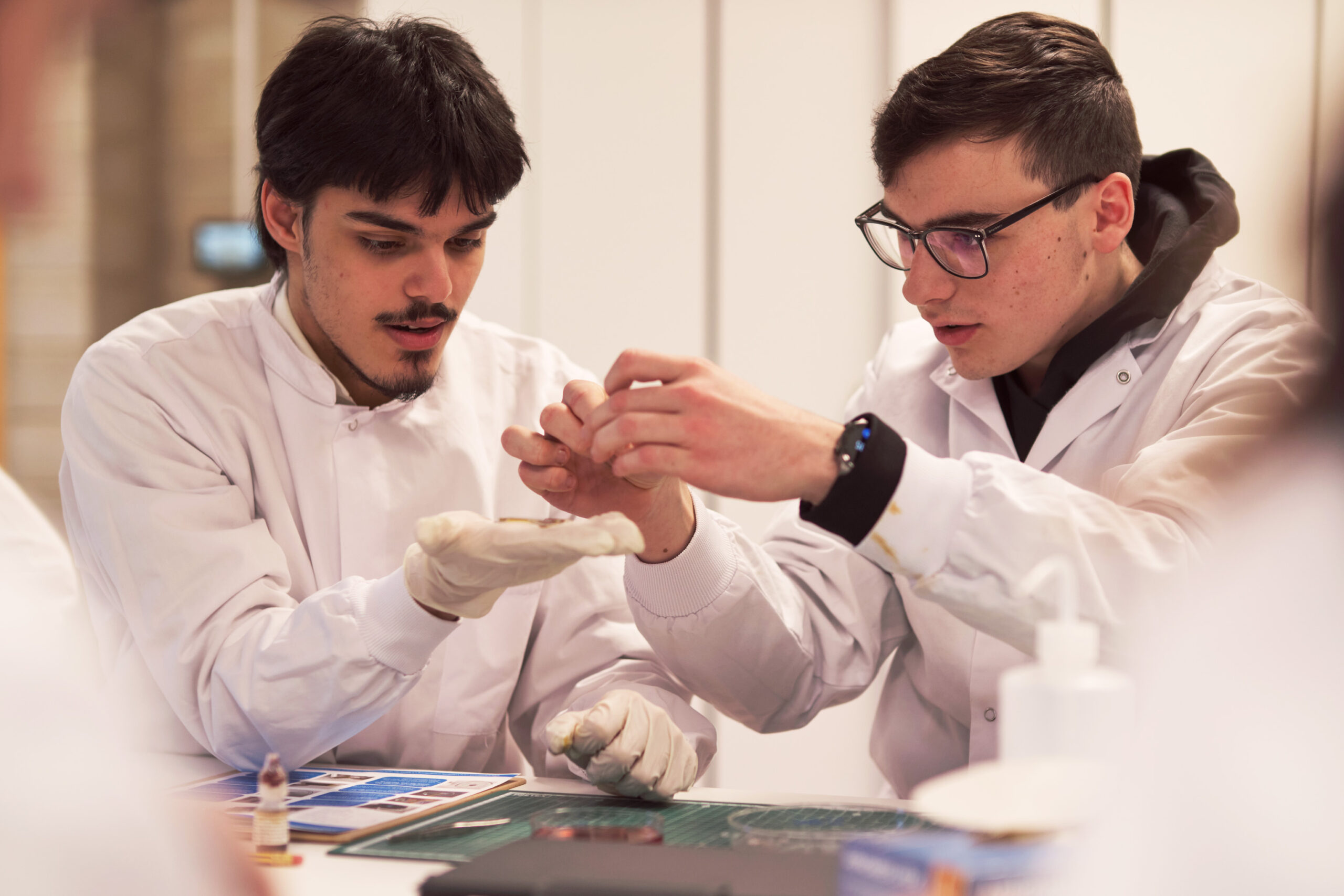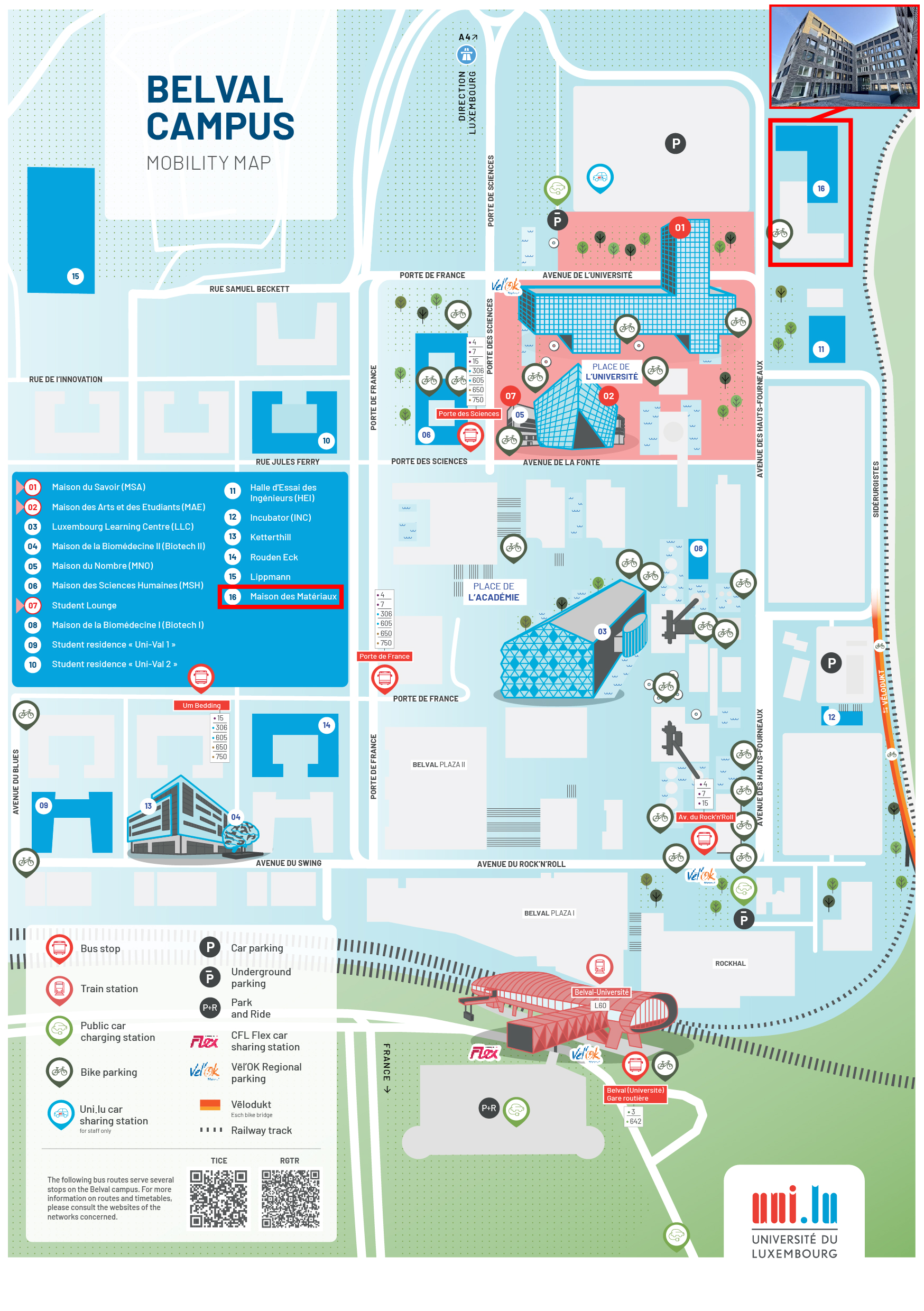Physics and Sustainability
The Scienteens Lab offers seven different workshops for secondary school classes combining physics and environmental sciences. They focus on topics such as solar cells, spectroscopy, renewable energies, CO2 emissions and climate change. Most of these workshops are designed for students aged 13 to 19. They take place on Campus Belval, under the supervision of the Scienteens Lab’s team. Each workshop is described in the table below. You can also get a glimpse of our physics workshops through a short video. We also offer sustainability workshops for adults through our Sustainability4Life programme.
The Physics & Sustainability workshops are supported by the André Losch Foundation.
Solar energy is everywhere but how can we use it ? How does a solar cell work? How can we measure its efficiency and use it to power appliances we use daily? During this workshop, students get the opportunity to discover the answers to these exciting questions. They get a better understanding of the current research on solar cells and find out why different solar cell technologies exist.
During the workshop, the students learn through hands-on experiments how to:
- Produce a dye-sensitised solar cell and compete to build the most powerful one
- Calibrate the light intensity and investigate the influence of the temperature with scientific equipment
- Use lasers and LEDs to describe the basic functioning of a semi-conductor
- Put solar panels in parallel and series, reaching a target voltage and current in order to power specific items
This full-day workshop is suitable for classes ranging from 2rd to 1st grade (students aged 17 to 19).
Prior knowledge on the following topics can be useful for the participants: Current, voltage, power in circuits, electrons orbitals and nuclear shell model.
What is light? Why do we need sunscreen? How efficient is it for blocking damaging radiation? In this workshop, students learn more about light and wavelengths through a day-to-day application. They use modern spectroscopy equipment to explore how electromagnetic radiations work. Then, following a simple recipe, they make their own sunscreen using natural ingredients and test its efficiency against UV radiation.
During this workshop, participants get a chance to:
- Discover the principles of wave interference and experimentally measuring light maxima and minima
- Construct their own DIY spectrometer to observe absorption and emission spectra of different gas lamps
- Test their natural sunscreen and find its SPF by measuring the absorption and transmission spectra for different wavelengths
This full-day workshop is suitable for classes ranging from 3rd to 1st grade, meaning students aged 16 to 19.
Prior knowledge on the following topics can be useful for the participants: Basic understanding of wavelengths.
How much energy do we use? Does our lifestyle affect the amount of energy we need? Could renewable technologies provide for all energy needs in Luxembourg? During this workshop, students get to search for answers using a self-assessment process and carrying out hands-on experiments. At the end of the day, they will be able to answer these questions through their own investigations.
During this workshop, participants get a chance to:
- Calculate their daily energy need and learn to solve the energy balance problem using the data they generated
- Learn the difference between power and energy
- Assess the potential of solar, wind, biomass or human powered technologies
- Discover the land surface area that would be occupied by the above technologies to meet their energy demand
- Compare their own energy consumption to that of other people and discuss whether Luxembourg could go 100% renewable
This half-day workshop is suitable for classes ranging from 5th to 1st grade, meaning students aged 14 to 19.
It can be combined with two other workshops focusing on energy and sustainability (see workshops 4 and 5 below).
This workshop was developed by a team of researchers from the Department of Physics and Materials Science of the University of Luxembourg in the framework of the Energy4Life project. You can find more information about this project on the dedicated e4l website. Energy4Life is supported by the Cinven Foundation.
What is the physics behind global warming ? How is the Earth getting hotter? In this workshop, students get to learn about CO2 as well as the albedo and greenhouse effects in the context of global warming. They discover properties of infrared radiation, learn ways to trap it and its relations to the greenhouse effect.
In this workshop, the students discover through hands-on experiments:
- Visible and infrared light
- Thermal radiation and heat capacity
- The albedo effect
This half-day workshop is suitable for classes ranging from 4th to 1st grade, meaning students aged 15 to 19.
It can be combined with two other workshops focusing on energy and sustainability (see workshop 3 above and 5 below).
Prior knowledge on the following topics can be useful for the participants: Basic understanding of light spectrum and wavelengths.
Everytime we charge our phone, use the oven or turn on the television, we consume energy. How does our energy demand varies over the course of a day or a year? How can we ensure to always have the energy we need when we need it? In this workshop, students learn more about power management, efficiency and energy storage. They carry out a series of experiments to discover how basic concepts in physics – such as force, work, energy and power – relate to real-life problematics.
During this workshop, participants get a chance to:
- Pump and store water to power a small turbine (converting excess energy to potential energy and then into electricity)
- Race electric cars to compare different powering methods (solar panels, batteries & capacitors)
- Investigate the most important factors for an efficient storage and consumption of energy
- Play a board game to get a glimpse of the challenges inherent to real-life energy & power management and reflect on possible solutions
This half-day workshop is suitable for classes ranging from 5th to 1st grade, meaning students aged 14 to 19.
It can be combined with two other workshops focusing on energy and sustainability (see workshops 3 and 4 above).
Prior knowledge on the following topics can be useful for the participants: Potential energy (from gravity), current, voltage and power in circuits.
How can we study an ecosystem and understand how it works? How do we test what we think? How do we go from hypotheses to facts? In this workshop, students take a scientific walk in the woods, explore the forest and learn how to follow the scientific method. They test their hypotheses about the functions and inner workings of the water cycle in this habitat and discover how to conduct research in a natural environment.
During the workshop, participants will:
- Learn about the scientific method for complex living systems and go from hypothesis to quantification & measurable fact
- Discover how the water goes from the roots to the leaves, then into the air and back to the soil
- Explore the mechanisms involved in plant water transport, such as capillary force, soil infiltration rate and more
- Learn what kind of research is currently done in Luxembourg to improve our understanding of the forests around us
This 3 hour workshop is suitable for classes ranging from 5th to 1st grade (students aged 14 to 19).
As it is a field trip, participants must bring their own lunch and be prepared for varying weather conditions.
Do planes release chemtrails to control our minds? Is the earth flat? Can we trust what we see in viral videos or should we use science to help us make sense of the world? In an internet era overflowing with misinformation, find out how to use some basic physics to debunk popular myths.
In this workshop where curiosity meets critical thinking, participants discover the power of the scientific method and test some common conspiracy theories using basic scientific principles and hands-on experiments. They learn how logic, evidence and critical thinking can be used to separate fact from fiction.
This half-day workshop on scientific reasoning is suitable for classes ranging from 7th to 3rd grade (students aged 12 to 16).
Energy Use & Renewables: Finding the Balance
How much energy do we really need, and how can we use it wisely? During this workshop, participants explore the link between energy use and energy production, combining self-assessment of their own consumption with hands-on experiments. Through interactive demonstrations, they discover the difference between power and energy, explore Luxembourg’s energy landscape, and understand which sectors consume the most. They learn practical strategies for reducing consumption at work and at home while contributing to a more sustainable future. This engaging workshop combines clear explanations, interactive polling, and group discussions to equip participants with actionable insights for the energy transition.
The participants:
- Get an overview of Luxembourg’s energy landscape
- Generate electricity on a bike to understand the concept of energy & power
- Calculate their daily energy needs and learn to solve the energy balance problem using the data they generated
- Compare their own energy consumption to that of other people and discuss whether Luxembourg could go 100% renewable
From a half-day in our lab to a two-hour session at your workplace, the format (schedule and location) is flexible to better suit your needs. Group size can also vary. We can offer these workshops in Luxembourgish, French, German or English.
Please contact Lara Bertemes by email to discuss the organisation of your workshop and the different price options.
More information on this project can be found on the Energy4Life website.
These adult workshops are supported by the Oeuvre Nationale.
The Energy4Life website is supported by the Cinven Foundation.



Practical information for all the workshops
Depending on the needs of the high-school students, the workshops in physics are either taught in English, French, German or Luxembourgish.
The full-day workshops (1 and 2) take place from 9:00h till 15:30h with a lunch break of one hour. During the lunch break the students can use the canteen. The lunch schedule need to be observed, so that the afternoon activities can resume on time. Please note, that the participants might want to bring a small snack for the morning, as the lunch break can be a bit late.
The half-day workshops (3, 4, 5, 6 and 7) last 3h30.
At the end of a workshop, each student receives a certificate attesting to his participation.
Physics & Sustainability workshops take place in the Maison des Matériaux (ANAS), on Campus Belval.
If you arrive by car or coach, take the A4 and keep it until the end, then follow the signs towards “Belval”. On the campus, there are no signs to indicate the way to the Maison des Matériaux. Please use the map below to find your way.
If you arrive by train, the stop is “Belval Université”. Our building is 10 minutes away from the train station by foot. There are also several buses that can be taken to arrive on the campus.
